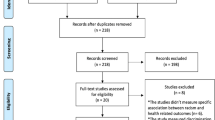Abstract
This paper explores the concept of health implied in the SF-36 within a group of Iranians in Australia. Qualitative data were collected from a sample of 21 people—10 females and 11 males. For the first time, the NUD*IST program was used to organize and manage the data in Persian (also known as Farsi), the language spoken by Iranians. Health was defined in terms of holistic, spiritual, social, physical/emotional aspects, and absence-of-disorder dimensions. Among these, physical, absence of disorder, holistic, and spiritual aspects of health were mentioned more frequently than other themes. The findings of the study raise concerns about the extent to which the SF-36 captures the diversity of the concept of health as expressed by the sample of Iranian migrants.
Similar content being viewed by others
References
Australian Bureau of Statistics: Community Profiles: Extracted From C-Lib. Canberra: Australian Bureau of Statistics; 1996
Boorse C: Health as a theoretical concept. Philos Sci 1077; 44:542-573
Cardus D, Thrall RM: Overview: Health and the planning of health care systems. Prev Med 1977; 6(1):134-142
Baranowski T: Toward the definition of concepts of health and disease, wellness and illness. Health Values: Achiev High Level Wellness 1981; 5:246-256
World Health Organization: Preamble to the Constitution of the World Health Organization as adopted by the International Health Conference. New York; 1946
Morse JM: The meaning of health in an inner city community. Nurs Pap: Perspect En Nurs 1987; 19(2):27-40
Stuifbergen AK, Becker HA, Ingalsbe K, Sands D: Perceptions of health among adults with disabilities. Health Values Achieving High Level Wellness (HEALTH-VALUES) 1990; 14(2): 18-26 (20 ref); 1990
Ware JE, Jr, Sherbourne CD: The MOS 36-item short-form health survey (SF-36). I. Conceptual framework and item selection. Med Care 1992; 30(6):473-483
Jenkinson C, Coulter A, Wright L: Short form 36 (SF36) health survey questionnaire: Normative data for adults of working age. BMJ 1993; 306(6890):1437-1440
Ware JE, Jr: SF-36 health survey update. Spine 2000; 25(24):3130-3139
Ware JE, Jr, Gandek B: Overview of the SF-36 Health Survey and the International Quality of Life Assessment (IQOLA) Project. J Clin Epidemiol 1998; 51(11):903-912
Staniszewska S, Ahmed L, Jenkinson C: The conceptual validity and appropriateness of using health-related quality of life measures with minority ethnic groups. Ethnicity Health 1999; 4(1/2):51-63
Bullinger M, Anderson R, Cella D, Aaronson N: Developing and evaluating cross-cultural instruments from minimum requirements to optimal models. Quality Life Res 1993; 2(6):451-459
Scott KM, Sarfati D, Tobias MI, Haslett SJ: A challenge to the cross-cultural validity of the SF-36 health survey: Factor structure in Maori, Pacific and New Zealand European ethnic groups. Soc Sci Med 2000; 51(11):1655-1664
Zargooshi J: Quality of life of Iranian kidney “donors.” J Urol 2001; 166(5):1790-1799
QSR NUD*IST 4: User Guide [computer program]. Version 4. Melbourne: QSR; 1997
Kuzel AJ: Sampling in qualitative inquiry: In: Miller WL, ed. Doing Qualitative Research: Research Methods for Primary Care. Vol 3. Thousand Oaks, CA: Sage; 1992:3-28
Denzin NK, Lincoln YS: Handbook of Qualitative Research. CA: Sage; 1994
Keller MJ: Toward a definition of health: Advances Nurs Sci 1981 Oct: 43-64; 1981
Pierret JH: Conducting discourse about health and their social determinants: In: Radley A, ed. Worlds of Illness: Biographical and Cultural Perspectives on Health and Disease. New York: Routledge; 1993:205p.
Williams R: Concepts of health: An analysis of lay logic. Sociology 1983; 17(2):185-205
Herzlich C: Health and Illness: A Social Psychological Analysis. New York: Published in cooperation with the European Association of Experimental Social Psychology by Academic Press; 1973
d'Houtaud A, Field MG: The image of health: Variations in perception by social class in a French population. Sociol Health Illness 1984; 6(1):30-60
Curtis S, Taket A: Health and Societies: Changing Perspectives. New York: Edward Arnold; 1996
Festinger L, d'Houtaud A, Field M-G: A theory of social comparison processes. The image of health: Variations in perception by social class in a French population. Human Relat 1954; 7(1):117-140
Buunk B, Gibbons FX: Health, Coping, and Well-Being: Perspectives From Social Comparison Theory. Mahwah, NJ: Erlbaum; 1997
Mihalopoulos C, Pirkis J, Naccarella L, Dunt D: The Role of General Practitioners and Other Primary Care Agencies in Transcultural Mental Health Care. Melbourne: Australian Transcultural Mental Health Network; 1999
Lipson JG, Meleis AI: Issues in health care of Middle Eastern patients. West J Med 1983; 139(6):854-861
Author information
Authors and Affiliations
Corresponding author
Rights and permissions
About this article
Cite this article
Momenzadeh, S., Posner, N. Iranian Migrants' Discourses of Health and the Implications for Using Standardized Health Measures with Minority Groups. Journal of Immigrant Health 5, 173–180 (2003). https://doi.org/10.1023/A:1026167109245
Issue Date:
DOI: https://doi.org/10.1023/A:1026167109245




